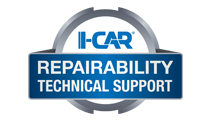OEM Restraints System Part Replacement Search
2012 BMW X3
Share:
|
DISABLE PROCEDURE AND TIME (Always Check Service Manual)
Before beginning with:• body repairs
• work on airbag or ETR units (removal, installation)
• work on components that are associated with the airbag and emergency tensioning retractor units or require access to their electric circuit, e.g. when removing the steering wheel, disconnect/insulate ground lead from battery.
Before carrying out any welding work: remove ignition key, disconnect/insulate ground line of battery and detach connector from restraint system control unit.
Work on components of the airbag system should only ever be carried out with the battery disconnected, the negative terminal post covered and the plug connection of the cable leading to the gas generator disconnected. If only the battery is disconnected, the following prescribed waiting period must be observed without fail:
1 minute for vehicles from 9/93
REV: 02/2021
PARTS THAT MUST BE REPLACED FOLLOWING A DEPLOYMENT
Check and/or replace following components after airbag deployment:Deployed Driver's airbag:
• Airbag module [AIRBAG,STEERING WHEEL]
• Steering Wheel
Deployed Front-passenger airbag:
• Airbag module [AIRBAG,INSTRUMENT PNL]
• Dashboard trim panel (must be replaced!)
Deployed Side airbag, front/rear:
• Active head restraint [The gas generator can be replaced up to 4 times]
• Airbag module [AIRBAG,FRONT SEAT]
• Door trim panel
• Seat
Deployed Head airbag:
• Airbag module [AIRBAG, ROOF]
Deployed Knee airbag:
• Knee protection (driver's and passenger's sides) [AIRBAG,KNEE BOLSTER]
• Replace faulty components
Active headrest on front seat:
• The firing unit may be replaced up to 4 times [per the replace document]. Triggering frequency is denoted on the label on the head restraint carrier.
PARTS THAT MUST BE INSPECTED AND REPLACED IF DAMAGED
Check and/or replace following components after airbag deployment:Satellites (control unit + sensor) Components:
• Satellite, A-/B-pillar, left/right [AIRBAG SENSOR,SIDE]
• Satellite, front door [AIRBAG SENSOR,FRT DOOR]
• Satellite, driver's/front passenger [AIRBAG SENSOR,FENDER]
• Satellite, vehicle centre [MODULE, AIRBAG CONTROL]
Cables and plugs
• Check cables and plugs for damage, replace if necessary.
(e. g. corrosion, correct engagement, bent pin)
Seat belt system
• Automatic reel
• Belt buckle tensioner
• Seatbelt height adjustment
• Anchor/ End fitting pretensioner
• Check components, replace if necessary
Seats
• Seat
• Airbag module
• Active head restraint
• Check seats (function check of seat mechanism), replace if necessary
• Check seat screw/bolt connections
Driver's airbag
• Airbag module
• Steering Wheel
• Steering column (if damaged)
• Check components, replace if necessary
Front-passenger airbag
• Airbag module
• Dashboard trim panel (must be replaced!)
• Supporting tube (if damaged)
• Check components; replace if necessary
Head airbag
• Airbag module
• Cover, A-pillar
• Roofliner
• Cover, B-pillar (if damaged)
• Cover, C-pillar (if damaged)
• Connection/mounting (on side frame)
• Check components; replace if necessary
Knee airbag
• Trim panel (driver's side)
• Knee protection
• Check components, replace if necessary
Passive knee protector
• Glovebox incl. knee protector (passenger side)
• Replace faulty components
• Check fastening elements
Repairing airbag cables
• Only repair those cables which show visible signs of damage. In the event of visible damage, make sure there is only one cable repair in effect after the repair work. If no visible damage can be identified, the entire cable must be replaced. When carrying out repairs to the airbag wiring harness, you must use the spare parts offered in the Electronic Parts Catalogue (EPC).
| Additional Information |
*This matrix does not currently contain all production vehicles sold in the United States. The contents were developed in cooperation with AudaExplore, a Solera company. The contents are based on the information available at the time of publication. Updates and additions will be posted as they become available. To ensure that you are using the most recent information, always refer to vehicle maker technical information.









